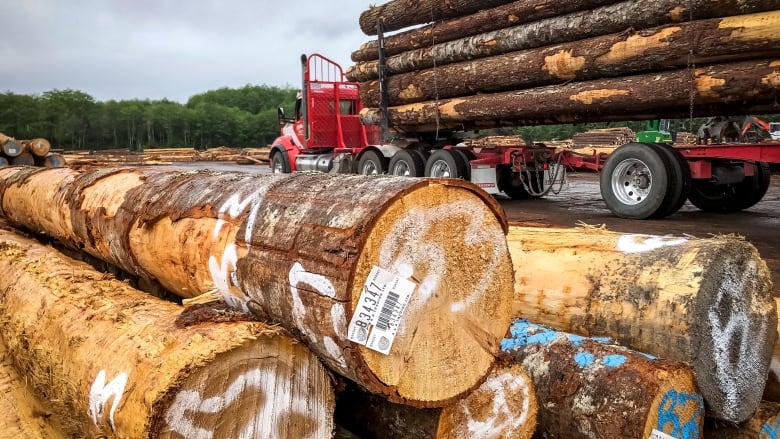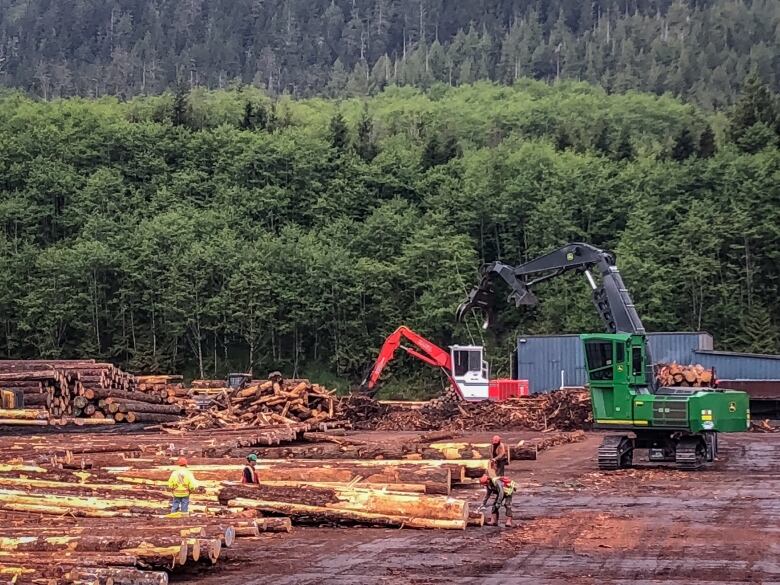'Open for business': How the Lax Kw'alaams First Nation revitalized forestry in B.C.'s northwest
'It was natural for a lot of our members who are fallers and buckers and scalers,' says Mayor John Helin

Carl Sampson remembers the desperation in Prince Rupert, B.C., when the city's main employer — pulp and sawmilling giant Skeena Cellulose — announced it was shutting down operations in 2001.
"It was pretty grim. The forestry industry as a whole took a hit. There was a huge downturn in the local economy, a lot of people were moving out," the 35-year-old member of the Lax Kw'alaams First Nation said.
That's when Lax Kw'alaams leadership decided the time was ripe to buy into forestry, purchasing timber rights during the Skeena Cellulose bankruptcy sale in 2005.
The First Nation paid $4.8 million for Tree Farm Licence No. 1. It was a huge risk, for a community with its own economic problems, including an unemployment rate hovering around 80 per cent.
"We didn't really have a revenue source other than transfer payments from the federal government," said Sampson, director of business and employment for Lax Kw'alaams Business Development Corporation.
"So, the hope was we could create a company that would generate revenues that would go back into community, to increase the quality of life for our members."

Thirteen years later the community's company, Coast Tsimshian Resources (CTR), is now the region's main player in forestry, and the First Nation is leveraging revenues to quietly transform itself into an economic engine in B.C.'s northwest.
Revitalizing an industry
Lax Kw'alaams is an isolated community of 1,000 residents, about one hour by boat from Prince Rupert. Band members historically relied on logging for seasonal employment, which is why the community decided to buy the Terrace-area tree farm licence.
"We've always done it. We've been loggers, we've been fishermen. We're hewers of wood. It was natural for a lot of our members who are fallers and buckers and scalers," said John Helin, mayor of Lax Kw'alaams.
What surprised many in the forestry industry was CTR's success at finding a market for wood nobody else wanted — low-grade hemlock and balsam. With no local pulp mill or sawmill to sell to, CTR built a global market for its product by shipping raw logs to Japan, Korea and China.

Raw log exports can be contentious, but it's proven a profitable strategy for CTR. The company's annual revenues have ranged from $12 to $26 million annually over the past decade.
"Right now, we're sitting cash positive and we're creating jobs. We're helping revitalize the industry," said Sampson.
"Ten years ago, nobody would have thought we'd be able to do this. But we've done it."
Forestry revenues helped pay for a new swimming pool and community centre in the village of Lax Kw'alaams. CTR profits also support community sport teams, and some years, have been distributed as dividends of $100 to each community member.
Transfer of decision-making
It's not only Lax Kw'alaams members who benefit from the First Nation's foray into forestry. CTR estimates its investments support between 60 and 80 full-time jobs in logging, trucking, debarking and longshoring.
Nowhere are those spin-off effects more evident than the bustling shipping terminal on Ridley Island in Prince Rupert.
Tidal Coast Terminal manager Tyler Latimer says CTR was the terminal's founding partner in 2008 and remains its primary client, supplying more than half the logs loaded there.
"We have long-standing relationships with First Nations here and we want to support those businesses they establish," said Latimer. "Canada is a resource-extracting country. We're all just trying to put food on the table for our kids."

Approximately a third of Tidal Coast's employees are First Nations.
"If we can support those First Nation businesses by giving their members opportunities to train and be part of our business, we absolutely will. We have to. I don't think we'd have a workforce if we didn't," said Latimer.
Forestry management firm A & A Trading also works closely with CTR, handling everything from construction of logging roads to tree planting.
A & A operations manager Robert Ziegler says First Nations' involvement in resource industries has grown in the past two decades, accelerated by numerous court decisions which expanded the definition of Aboriginal title.
That has meant an adjustment for some players in the forestry industry.
"I think what everyone is wrestling with is not a transfer of ownership, but a transfer of decision-making that is slowly occurring," said Ziegler. "Everyone is grasping how that is going to play out. And it's not going to happen tomorrow, next month or next year."
Ziegler said resources companies can't operate in Indigenous traditional territories without fully understanding the First Nations political landscape.
"Every First Nation has their own views, others are more pro-conservation. First Nation territories are not singular, there's a lot of overlap. That's where it becomes difficult for any proponent, and the Crown too," he said.
Mayor Helin says resource companies that don't treat First Nations with respect simply won't succeed.
"Everybody has to win or it's not going to work," said Helin. "We've been here for thousands of years, we're not going anywhere, so deal with us. Respectfully."
We're not against development. If we can look after the environment, we have to seriously look at [liquified natural gas].- John Helin, mayor of Lax Kw'alaams
'Open for business'
Revenue from forestry operations allowed Lax Kw'alaams to diversify their economic portfolio.
The band's economic development arm now owns a real estate holding company, a water taxi company, and a cedar mill. It's invested in multiple joint ventures, including a helicopter charter business.
But Helin is most proud of the state-of-the-art fish processing plant opened in 2012, which now employs 100 people with steady work for nine months of the year.
"It's huge for the members. They got a steady income and they're able to be proud," said Helin.
"You have to have a job, you have to have self-worth, and that's huge for anybody, to be able to provide for your family."

Despite these successes, Helin feels the sun is setting on forestry and fishing. He says his community needs to diversify, and he's hopeful Lax Kw'alaams will be the site of an LNG terminal one day.
"We're not against development. If we can look after the environment, we have to seriously look at that [LNG]," said Helin, though he acknowledges some in his community are vocally opposed to any oil and gas proposals.
"I'll get the right information to my members and let them make the decision. Everybody should have a say in my community in what they see going forward to the future," he said.
"So yes, we're open for business."

